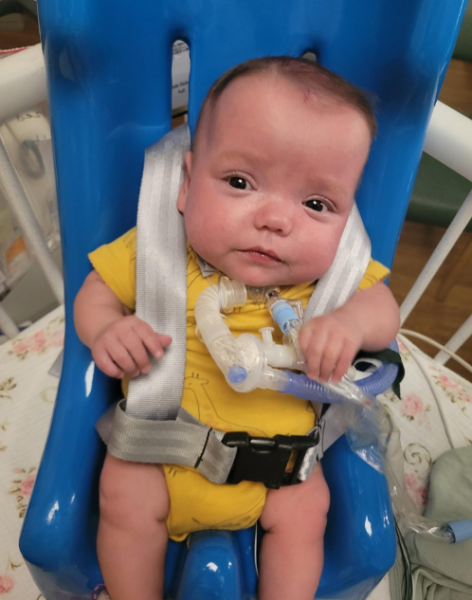Click here to download the brochure with complete course details.
COURSE DESCRIPTION:
Advance your assessment, treatment, and outcomes for infants requiring a tracheostomy tube. Medical co-morbidities associated with infants requiring a tracheostomy tube, implications of the tracheostomy tube on oral feeding/motor development, integrating physical rehabilitation treatments and respiratory therapy interventions to maximize infant outcomes with oral feeding, motor development, and daily activities related to play skills will be discussed. Expand your practice by integrating evidence into your clinical decision-making including reading/interpreting vent settings during interventions for objective assessments of infants that are intubated or have tracheostomy tubes. Expanded lecture/lab section devoted to infants with tracheostomy tubes include oral motor, feeding interventions, postural control, manual cough facilitation, positioning/handling, integrating use of a one-way valve into treatment, weaning respiratory support, and durable medical equipment recommendations for infant/family in preparation for home discharge. This course will focus on infants up to 12 months corrected gestational age with information applicable to clinicians working in the NICU, PICU, transitional pediatric care, in-home therapy, early intervention, and outpatient clinics.
LEARNING OBJECTIVES:
- Differentiate medical pathology from normal development for infants requiring a
tracheostomy tube.
- Determine how the placement of a tracheostomy tube influences the development of oral feeding and postural control skills.
- Identify three risk factors for feeding dysfunction associated with oral feeding an infant with a tracheostomy.
- Apply at least two feeding strategies for infants requiring a tracheostomy tube to improve sensory and motor performance with oral feeding.
- Apply at least two postural control strategies for infants with a tracheostomy tube to improve their ability to utilize vocal cord movement to enhance their cough, phonation, and gross motor movement.
- Choose an individualized care plan for an infant using the provided case study with tracheostomy tubes for improved outcomes with oral feeding, cough facilitation, motor control, and phonation.
AUDIENCE:
Clinicians in the NICU, PICU, transitional pediatric care, in-home therapy, early intervention and outpatient clinics. Infants up to 12 months corrected gestational age.
__________________________________________________________________________________
ON-DEMAND SCHEDULE:
2 hrs 12 minutes:
Updates in Evidence: Includes Resources and References for Individualized Learning
Tracheostomy Tubes
• Information on types of infants that require tracheostomy tube placement
- Pulmonary: bronchopulmonary dysplasia
- Cranial Facial: airway anomalies
- Neuromuscular: myotonic dystrophy, hypotonia
- Neurological: brain injury or malformation
- Genetic conditions: airway compromise, musculoskeletal conditions
• Equipment
- Tracheostomy tubes: cuffed verse cuffless trach
1 hr 49 minutes:
- Ventilators and vent settings
- Weaning from vent, trach mask
Lecture and LAB: Oral Motor Interventions and Pre-feeding Assessment
• Oral motor interventions
• Secretion management
• Monitoring vent settings
2 hrs 13 minutes:
Lecture and LAB: Oral Feeding Interventions
• Implications of vent settings on oral feeding skills
• Critical reason for assessing the Oral, Pharyngeal and Esophageal phase of oral feeding
• Bottle selection: sensory and motor considerations
• Monitoring for aerophagia, techniques for gastric decompression
Dysphagia Risk
• Integration of standardized swallow assessment: video fluoroscopy swallow study
• Treatment options: altered oral feeding: thickened feeding, advancing to solids
LAB and Lecture: Postural Control Development for Infants with Tracheostomy Tube
• Assessment of ribcage development and implications of artificial airway
• Discussion of influence of pulmonary, GI, and musculoskeletal development for older infants
2 hrs 08 minutes:
• Manual cough facilitation: vibration and percussion
• Rolling facilitation
• Pelvic Floor activation with weight bearing
• Spinal extension facilitation
• Managing rib flares for infants with inverted diaphragm, complex BPD
• Scapular mobilization for ribcage elongation
• Facilitation of ribcage development
• Diaphragm activation –
• Consideration of trach cuff inflation/deflation
• Advancing Infant to Use a One-way Valve
Additional Considerations
• Self-care: bathing, dressing
• Community mobility: equipment considerations
• Family training
• Developmental play tasks for home program
• Adjunct interventions
• Goal writing to support tracheostomy tube decannulation (if applicable to infant)
Case Study
30 Minutes:
Post-test
Holly Schifsky, OTR/L, CNT, NTMTC, CBIS, has worked in pediatrics for the past 28 years with the past 17 years in a level IV NICU. She is a Certified Neonatal Therapist, Certified Neonatal Touch and Massage Therapist, Certified Brain Injury therapist, a member of National Association of Neonatal Therapists, and has completed 6-month mentorship in infant/child NDT.
She has worked within the NICU and NICU follow-up clinic to maximize patient and family outcomes for the most complex premature and medically-fragile term infants. Holly received her BS in OT from the University of North Dakota. She is a faculty member for the Neonatal Touch and Massage certification; and Manuel Edema Mobilization training. She is the recipient of the National Association of Neonatal Therapists Clinical Excellence award in 2018, due to her clinical expertise and dedication to advancing the therapeutic interventions for NICU infants with cardiopulmonary conditions.
Financial Disclosures: Holly Schifsky receives a speaking fee when she teaches for ERI.
Non-Financial Disclosures: Holly Schifsky has no relevant nonfinancial relationships to disclose.
Once you purchase an online course you will have access to the course materials. If you have purchased this course, please ensure you have logged in to your account in order to take the exam.
Once you purchase an online course, you will have the opportunity to take an exam to test your retention of the material. If you have purchased this course, please ensure you have logged in to your account in order to take the exam. The exam must be completed with a pass rate of 80% or more in order to receive your certificate of attendance.
Continuing Education Hours for disciplines not listed below: 8.5 contact hours (0.85 CEUs). Intermediate level. License #______________.
Education Resources Inc. is an AOTA Approved Provider of professional development. Course approval ID# 04763. This Distance Learning-Independent Course is offered at 8.5 contact hours 0.85 CEUs, Intermediate Level, OT Service Delivery. AOTA does not endorse specific course content, products or clinical procedures. This course can be used toward your NBCOT renewal requirements for 8.5 units. Provider for the FL Occupational Therapy Association CE Broker for 10 CE Hours - approval #20-1130452. ASHA CEUs are awarded by the ASHA CE Registry upon receipt of the CEU Participant Form from the ASHA. Approved CE Provider for up to 0.85 CEU’s. ASHA CE Provider approval and use of the Brand Block does not imply endorsement of course content, specific products or clinical procedures. Course meets the basic criteria of the MD Board of Physical Therapy Examiners for __ CEU's. Approval #2312-67 by the NJ State Board of Physical Therapy Examiners for 8.5 CEC's. Approved sponsor by the State of IL Department of Financial and Professional Regulation for Physical Therapy for 10 contact hours. The Illinois Early Intervention Training Program has approved this event for 9 hours of EI credential credit in the area of Intervention. Approved provider by the NY State Board of Physical Therapy for 10 contact hours (1.0 CEUs). Education Resources is an approved agency by the PT Board of CA for 8.5 contact hours. Approved by the APTA Kentucky, A Chapter of the American Physical Therapy Association, for 8.5 Category 1 contact hour(s). Expiration Date: 3/6/25, approval # CS61-2023-APTAKY. This activity is provided by the TX Board of PT Examiners accredited provider #2210017TX for 8.5 CCUs and meets continuing competence requirements for PTs and PTAs licensure renewal in TX. Approved Provider for OK State Board of Medical Licensure & Supervision #BAP202310003. This course meets the criteria for 8.5 hours that can be applied toward the Neonatal Therapy National Certification. 8.5 hours of this course qualify towards the discipline-specific hours for the 20-hour requirement for NDTA re-certification. They do NOT qualify towards the 8-hour NDTA Instructor requirement for re-certification.
Education Resources Inc., 266 Main Street, Suite 12, Medfield, MA 02052 508-359-6533






